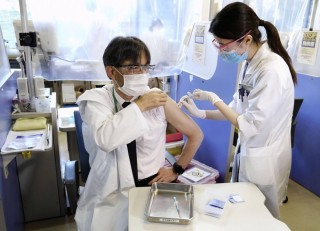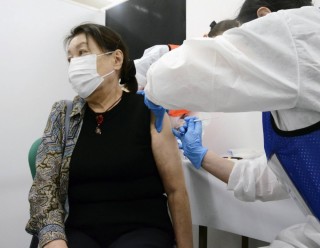Loading
Search
▼ Japan's Eight-Month Booster Shot Timeline Could Cause Large Sixth Wave, Study Says
- Category:Other
The health ministry’s plan to administer third doses of the COVID-19 vaccine at least eight months after an individuals’ second shot needs to be reconsidered and the timeline should be shortened, according to projections by a researcher at the University of Tokyo.
Failing to accelerate the rollout of booster shots may lead to a new wave of infections that could far surpass that of the fifth wave over the summer, the projections show.
Yukio Ohsawa, a professor at the university’s graduate school of engineering, made three projections based on scenarios where fully vaccinated individuals get booster shots six months, eight months and less than six months after a second dose.
The first two projections showed that daily new cases nationwide would show a similarly sharp rise starting sometime in the autumn or early 2022, and that cases would top this summer’s fifth wave under a scenario where boosters are given after six to eight months.
“Tokyo cases alone will top 1,000 and it would be difficult to curb the figures to less than 10,000 at its peak,” Ohsawa said in the research, which also projected a rebound in serious cases in winter unless a booster shot is given at shorter intervals than six months.
New cases nationwide, however, would continue its extended decline from the fifth wave’s peak in late August and head toward zero early next year if a booster is given as soon as the vaccine’s efficacy wanes.
Breakthrough infections are still considered rare but have been increasing as the highly contagious delta variant has replaced other variants in Japan.
The U.S. Centers for Disease Control and Prevention says that studies have shown that vaccinated people are eight times less likely to be infected and 25 times less likely to experience hospitalization or death. Vaccines remain effective in protecting most people from COVID-19 infection and its complications, according to the CDC.
The health ministry last month decided to start giving booster shots as soon as late this year, starting with health care workers, who were the first to receive the vaccine in February.
Citing the hugely uneven global gap in vaccine supply, World Health Organization chief Tedros Adhanom Ghebreyesus has been calling for a moratorium on booster shots, saying that about 75% of more than 6.4 billion vaccines have been administered in high- and upper-middle income countries, while less than 5% of people in Africa are fully vaccinated.
How long vaccine protection lasts varies greatly depending on each individual, and some people have reportedly been infected within two weeks after a second dose.
Manufacturers of messenger RNA (mRNA) vaccines administered in Japan — Pfizer and its German partner BioNTech SE, as well as U.S. firm Moderna Inc. — have been developing booster shots in the belief that a third dose will be necessary sometime between six and 12 months after people get their second shot.
Pfizer’s clinical study — based on around 42,000 volunteers in six countries and published on the medRxiv preprint server for health sciences — showed that the efficacy of the vaccine was 96.2% starting seven days after a second dose.
It then fell 6 points by two months after the second dose and another 6 points four months after, and finally to 83.7% in the four- to six-month period. Similar declines have been reported for Moderna vaccine as well.
Ohsawa’s study, which has been published in the Medical Research Information Center Global’s mail magazine, assumed that all vaccines’ efficacy in preventing infection peaks at 95% one to two weeks after the second dose and declines by 1/200 per day after that.
“As long as the doctors make a judgment on each patient and administer a shot when a decline in immunity is confirmed, the sixth wave will not top the fifth wave (in daily new cases),” Ohsawa added. “The effect of doctors judging (the timing of a booster) depending on a patient is striking.”
Ohsawa told the Women’s Self weekly magazine that new cases would be curbed substantially if booster shots were given starting about four months after the second dose, when antibody levels start to decline sharply. He added that ideally booster shots should start to be given to older people, who are at higher risk of serious illness, by the end of the year.
Based on the previous year’s pattern, experts believe the next wave of infections could emerge soon and peak sometime in the winter. But with more than 63% of the nation’s residents fully vaccinated, Takeshi Urano, a professor at Shimane University’s Faculty of Medicine, and other experts project the next wave will likely not be as big as the one this summer.
Urano’s analysis of new cases in each prefecture has shown that the vaccination rate and the number of new cases have a negative relationship in general, excluding some prefectures with bigger populations like Tokyo.
He added that to reduce the number of seriously ill patients, inoculating unvaccinated individuals would be more important than a booster shot.
“Vaccinations can curb new infections, and it’s clear that the next wave projected for winter will see infections of mainly unvaccinated individuals,” he said.
“As long as the doctors make a judgment on each patient and administer a shot when a decline in immunity is confirmed, the sixth wave will not top the fifth wave (in daily new cases),” Ohsawa added. “The effect of doctors judging (the timing of a booster) depending on a patient is striking.”
Ohsawa told the Women’s Self weekly magazine that new cases would be curbed substantially if booster shots were given starting about four months after the second dose, when antibody levels start to decline sharply. He added that ideally booster shots should start to be given to older people, who are at higher risk of serious illness, by the end of the year.
Based on the previous year’s pattern, experts believe the next wave of infections could emerge soon and peak sometime in the winter. But with more than 63% of the nation’s residents fully vaccinated, Takeshi Urano, a professor at Shimane University’s Faculty of Medicine, and other experts project the next wave will likely not be as big as the one this summer.
Urano’s analysis of new cases in each prefecture has shown that the vaccination rate and the number of new cases have a negative relationship in general, excluding some prefectures with bigger populations like Tokyo.
He added that to reduce the number of seriously ill patients, inoculating unvaccinated individuals would be more important than a booster shot.
“Vaccinations can curb new infections, and it’s clear that the next wave projected for winter will see infections of mainly unvaccinated individuals,” he said.
- October 10, 2021
- Comment (0)
- Trackback(0)



